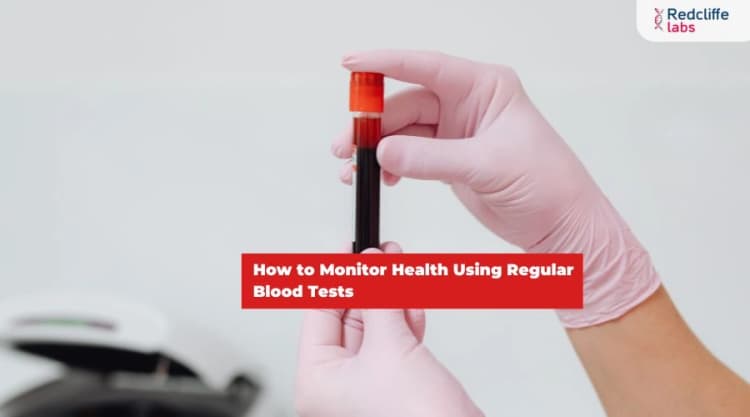The High-Sensitivity C-Reactive Protein (hsCRP) Test...Read more
Blood
Unlock special
discount on
this package
Login to Unlock 🔓
NABL Accredited lab*

Booking Benefits Unlocked Worth FREE 799

Report Consultation

Diet Plan
*Available once your report is generated.
At Redcliffe Labs, we have a single goal: to give India its right to quality diagnostics.
Customers served
Tests Processed Everyday
Cities
Collection Centres
World Class In-house Labs
Home Collection Experts
1 Test Parameters
High Sensitivity C-Reactive Protein (Hs-CRP)
1 PARAMETER INCLUDED
1 PARAMETER INCLUDED
- HsCRP (High Sensitivity C Reactive Protein)
Top Booked Health Checkup Packages
Reports in 12 hours
|Parameters 94
Reports in 12 hours
|Parameters 89
Reports in 12 hours
|Parameters 96
Reports in 12 hours
|Parameters 96
Reports in 12 hours
|Parameters 90
Helps you know your test better
What is the hsCRP blood test?
What is the hsCRP normal range?
What are the signs of high CRP?
What food to avoid in case of high CRP levels?
Verified by Medical Expert

WRITTEN BY
Sheena Mehta

MEDICALLY REVIEWED BY
Dr. Pradeep Lodha
Table of Content
Introduction to the HsCRP Test
HsCRP, or high-sensitivity C-reactive protein, is a marker of inflammation in the body. It helps to assess the risk of several cardiovascular diseases like myocardial infarction, stroke, peripheral vascular disease, and sudden cardiac death. The HsCRP test is a simple blood test that measures the low levels of inflammation. The high HsCRP levels indicate inflammation, even when you feel no symptoms. While symptoms like fever, fatigue, or joint pain could accompany high HsCRP, it often remains silent, making the test crucial for preventive care—factors like obesity, autoimmune diseases, diabetes, and lifestyle factors. Your doctor may recommend the HsCRP blood test for people to assess the risk of heart diseases with high cholesterol levels. Doctors typically recommend the HsCRP lab test for individuals at moderate risk of heart disease, even with normal cholesterol levels. It may be used in combination with other tests, such as a lipid panel, or with other cardiac risk markers,
By keeping an eye on HsCRP, you and your doctor can proactively manage inflammation and take steps to minimize your risk of future health complications. Take the HsCRP test from Redcliffe Labs to monitor your heart-related risks. Choose us as your trusted healthcare partner to get the HsCRP test. Book your appointment online, and the phlebotomist will come to your place for a sample collection. With us, you will get the best diagnostic services at affordable prices.
Test details in brief
| Also Known As | High-Sensitivity C-Reactive Protein (hs-CRP ) Test, hs-CRP, Cardiac CRP, CRP for heart disease |
| Purpose | The test is a marker of inflammation that diagnoses one's chances of coronary artery disease. |
| Preparation | Do not take any over-the-counter medicine without confirming with your Doctor. |
| Fasting | No Fasting Required |
| Get Reports | Within 15 hours |
| HsCRP Test Price | INR 699 - Rs 800 |

Purpose of the HsCRP Test
The HsCRP test is a cardiac risk marker and helpful in preventive healthcare. Here are a few objectives of the HsCRP test.
- Evaluating Cardiovascular Risk- The test predicts future cardiovascular risks like heart attack and stroke, even in people with normal cholesterol levels.
- Monitoring Inflammatory Conditions- HsCRP levels can elevate due to various inflammatory conditions like rheumatoid arthritis, lupus, or inflammatory bowel disease. The test helps to monitor the efficacy of treatment for these conditions by tracking changes in inflammation levels. This allows your doctor to adjust medications or treatment strategies for optimal management.
What does the HsCRP test measure?
The HscRP test measures the levels of high-sensitivity C-reactive protein in your blood. The liver produces this protein, which causes inflammation. The HsCRP lab test assesses the risk of heart attack or stroke risk, even in people with normal cholesterol levels. The test also detects inflammation conditions like rheumatoid arthritis, lupus, or inflammatory bowel disease. The low-level inflammation can also cause atherosclerosis, a condition in which blood vessels narrow due to the build-up of cholesterol and other lipids, and may cause cardiovascular diseases (CVD). The HscRP blood test can track the inflammation before causing the symptoms of chronic diseases to prevent disease progression. The normal hsCRP level is less than 1.0 mg/L. Always consult your doctor to interpret your results in context and discuss the next steps if necessary.
Preparation for the HsCRP test
No such preparation is needed before the HsCRP test. You need to follow the below instructions-
- No fasting required- The HsCRP test doesn't require fasting. You can eat and drink normally before the test.
- Consult your doctor- Some medications can interfere with your test results. However, inform your doctor about any medications and supplements you're taking. If you've recently recovered from surgery or acute infection, mention them to your doctor before the test.
- Hydration- Stay hydrated to ensure smooth blood draw.
The procedure of the HsCRP test
The HsCRP test is a simple blood test. During the process, the phlebotomist will ask you to draw a blood sample from a vein in your arm. He will tie a tourniquet or band on your arm and will clean the arm area with an antiseptic solution. After that, he will insert a small needle into the vein to collect the blood sample. After collecting the blood sample, the needle will be removed, and the puncture site will be covered with a bandage. You might feel slight discomfort during the process, but this will get normal soon. The sample will be sent to the laboratory for analysis, and test reports will be provided in a few hours.
What do the HsCRP test reports indicate?
The HsCRP test reports will be provided within 15 hours. Consult your test reports with your doctor. The test reports will show the following interpretations-
- Normal Level- The normal range of HsCRP levels is lower than 1.0 mg/L, which means no risk of Cardiovascular diseases and a low risk for inflammation-related conditions.
- Moderate Level- Higher than 1.0 to 3.0 mg/L indicates a moderate risk of CVD and mild inflammation due to infections like bronchitis or pneumonia, autoimmune diseases like rheumatoid arthritis or lupus, dental problems, metabolic syndrome, and cancers.
- High Level- The range higher than 3.0 mg/L indicates a high risk of CVD, including heart attack, stroke, and inflammatory bowel disease (IBD).
HsCRP levels can fluctuate even in healthy people due to stress, exercise, and sleep. Your doctor will consider your medical history, family history, and other risk factors for proper diagnosis. However, monitoring HsCRP levels over time can help track management and manage certain conditions.
Who is at risk of Heart Disease?
Many people are at high risk of heart disease due to certain risk factors. The hsCRP lab test is a preventive checkup to assess the risk of heart issues, and people with a high risk must take the test. Here are some risk factors:
Risk factors
- Age- The risk of heart disease increases in males and females.
- Gender- Men are at higher risk than women of heart issues.
- Genetic Factors- If you have a close family member with heart disease, it significantly increases your risk.
People with certain health conditions like-
- High blood pressure
- High Cholesterol
- Diabetes
- Have unhealthy lifestyle
- Physical inactivity
- Smoking
- Obesity
- Stress and depression
- Alcohol abuse
- Autoimmune diseases
- Chronic kidney disorders
If you have any concerns related to your heart disease risk, consult your doctor. They can assess your risk factors and provide personalized recommendations to help you protect your heart health.
Complications of High HsCRP Levels
High levels of HsCRP levels could be a sign of various health issues, including-
- Heart failure
- Stoke
- Heart attack
- Cancer
- Rheumatoid arthritis
- Inflammatory bowel disease
- Infection
- Lupus
- Tuberculosis
- Peripheral arterial disease (PAD)
- Autoimmune diseases
The severity of complications depends on various factors like the levels of HsCRP, underlying cause, medical history, and other risk factors. However, early detection and management of high HsCRP, either through lifestyle changes or appropriate medical interventions, can significantly reduce the risk of complications and improve long-term health outcomes.
What are the common symptoms related to abnormal HsCRP tests?
Abnormal HsCRP levels do not mean showing signs or symptoms; they could be asymptomatic for a long time. However, below are some general symptoms associated with high HsCRP levels, but these are not specific-
- Fatigue or tiredness
- Joint and muscle pain
- Low-grade fever
- Headaches
- Loss of appetite
- Sleep disturbances
- Sudden weight loss

What are the risks of the HsCRP blood test?
The HsCRP blood test has no or minimal risks. It's a safe and routine procedure with negligible complications. However, here are some potential aspects to consider:
- Minimal pain and discomfort during sample collection.
- Fainting and bruising
- Haematoma
- Risk of Infection
- Multiple puncture sites
When should you take the HsCRP Test?
Currently, there is no specific information on when to get tested through some guidelines on the hsCRP test.
The test may be most useful for detecting people with a 10% to 20% chance of having cardiac issues within the next ten years.
However, the high-sensitivity C-reactive (Hs-CRP) test is recommended in the following situations:
- To assess heart disease risk—If you are at high risk for cardiovascular disease, such as if you have high blood pressure, high cholesterol, diabetes, or a family history of heart disease, your doctor may recommend that you take a hs-CRP test to assess your risk for heart attacks or strokes.
- Monitoring Inflammation—If you have a condition that causes chronic inflammation, like rheumatoid arthritis, lupus, or inflammatory bowel disease, you can undergo the hs-CRP test, which can help monitor inflammation levels in your body.
- When Advised by a Doctor- Your healthcare professional may advise you to take the hs-CRP test based on symptoms or risk factors.
- Prevention Strategy- If you do not have symptoms but have risk factors for heart disease, such as smoking, obesity, or a sedentary lifestyle, then you must take the hs-CRP testing as part of a preventive health assessment.
- Post-Surgery or Injury- The test can also be useful in assessing inflammation following surgery or an injury.
What causes High HsCRP Levels?
High hs-CRP test level is often found in people at risk of cardiovascular disease who have no history of CVD. Here are some common causes of High hs-CRP levels.
- Atherosclerosis- Inflammation of blood vessels due to plaque buildup can raise hs-CRP levels.
- Heart Attack or Stroke Risk- Chronic inflammation contributes to cardiovascular events.
- Chronic Infections- Persistent bacterial or viral infections, such as tuberculosis or hepatitis, can lead to elevated hs-CRP.
- Autoimmune Disorders—People with rheumatoid arthritis, lupus, or psoriasis trigger chronic inflammation and increase hs-CRP.
- Obesity- People who are obese are at high risk of CVDs. Excess body fat, especially visceral fat, releases inflammatory markers and may raise hs-CRP levels.
- Diabetes- Uncontrolled blood glucose levels cause inflammation and may lead to high hs-CRP levels.
- Smoking and Alcohol Consumption- Smoking and excessive alcohol intake are linked to increased inflammation, which can increase your hs-CRP levels.
- Chronic Kidney Disease- Kidney dysfunction often leads to systemic inflammation and higher hs-CRP levels.
- Recent Surgery or Injury- Healing processes after surgery or trauma can temporarily raise hs-CRP.
- Certain Cancers- Certain tumors can trigger inflammation and increase hs-CRP levels.
- Other Inflammatory Conditions- Diseases like Crohn’s disease, ulcerative colitis, and chronic bronchitis can raise levels.
- Lifestyle Factors- Certain lifestyle habits can also influence hs-CRP levels, including a sedentary lifestyle, high-fat diets, and stress, which may elevate hs-CRP.
Tips to manage high HsCRP Levels
To manage your hs-CRP levels, you must make some lifestyle changes. Here are some tips to follow-
- Adopt an Anti-Inflammatory Diet- Try to include fresh vegetables rich in foods rich in omega-3 fatty acids like fatty fish (salmon, mackerel), flaxseeds, and walnuts. Eat whole grains, such as oats and quinoa, instead of refined carbohydrates—spices like turmeric and ginger with anti-inflammatory properties.
What to avoid?
Processed foods, sugary beverages, and trans fats.
Excessive red meat and fried foods.
- Healthy Weight- Exercise regularly and take a balanced diet to shed weight and lower hs-CRP levels.
- Exercise Regularly—Engage in physical activity like walking, cycling, or swimming for at least 30 minutes four to five times a week.
- Quit Alcohol and Smoking- Stay away from smoking and drinking habits to lower your hs-CRP levels.
- Manage Stress Levels—Avoid stress, as chronic stress may increase your hs-CRP levels. Instead, practice stress-reducing techniques like meditation, yoga, or deep breathing exercises.
- Get Enough Sleep—Get comfortable and get at least 7-9 hours to refresh your body.
- Control Underlying Health Conditions - If you have any health issues like diabetes, hypertension, or cholesterol, then try to manage your health issues with a healthy diet and medication.
- Take Medications if Prescribed—Medications like statins and aspirin can help reduce inflammation and lower cholesterol levels. Consult your doctor before taking any medication.
- Regular Health Checkups- Monitor hs-CRP levels periodically if you are at risk for inflammation-related conditions like heart disease.
HsCRP Test price at Redcliffe Labs
The HsCRP test price starts at Rs 699 and goes up to Rs 800 at Redcliffe Labs. Book your test online with Redcliffe Labs for the best discounts and offers. With us, you do not need to travel to a lab, as we offer a convenient home sample collection. Our phlebotomist will reach you on time at your location. You can book tests and access reports through their user-friendly website or app. You can also avail of the best discounts and offers on our wide range of diagnostic tests. Also, you don't need to worry about the quality results; our labs are NABL and ISO-certified, ensuring high standards of quality and accuracy. So, what are you still waiting for? Book your High-Sensitivity C-Reactive Protein test now!

HsCRP Test Price in Different Cities
| City Name | Discounted Price |
| Delhi | ₹699 |
| Mumbai | ₹699 |
| Bangalore | ₹699 |
| Noida | ₹699 |
| Pune | ₹699 |
| Lucknow | ₹800 |
| Ahmedabad | ₹699 |
| Hyderabad | ₹699 |
| Chennai | ₹699 |
| Gurgaon | ₹699 |
| Jaipur | ₹800 |
| Faridabad | ₹699 |
| Indore | ₹800 |
| Patna | ₹800 |
HsCRP Blood Test Matters for Your Preventive Health
Inflammation is the body's natural response to injury or infection. But chronic, low-grade inflammation, if you remain undetected, can increase your risk for serious health problems like heart disease, stroke, and even Alzheimer's. This is where the HsCRP blood test comes in importance. By including the HsCRP test in your regular preventive health checkups, you can detect the early warning signs of cardiovascular diseases. Various factors like stress, smoking, and obesity can influence HsCRP levels. Tracking your HsCRP over time can give your doctor a clearer picture of your overall health and potential health risks. Take a regular HsCRP Level test and consult your C reactive protein Hs test reports with your doctor. A healthy lifestyle with regular exercise, a balanced diet, and stress management remain the cornerstones of preventive health.
5 Simple Steps to Manage Your Health with Redcliffe Labs
Quick, Simple & Convenient; trusted care delivered to your doorstep.

Start Your Online Booking
Open the Redcliffe Labs website/app. Select the test or package and enter your details. Schedule the service for your preferred slot.

Live Tracking
Stay updated with real-time tracking for a smooth and timely home sample collection.

Sample Collection
Our certified experts ensure a smooth, hygienic, and fully compliant sample collection experience.

Doctor-Verified Smart Reports
Every report is clinically checked by expert doctors and shared with smart, actionable insights.

Your Health Journey Continues Post Reports
Consult with our expert medical team to get actionable insights to improve your health.
Nearby Labs(9)
Redcliffe Labs Noida

MC-5280
Redcliffe Collection Center
Redcliffe Collection Center
Redcliffe Collection Center
Redcliffe Collection Center
Redcliffe Collection Center
Redcliffe Collection Center
Redcliffe Collection Center
Redcliffe Collection Center
Frequently Asked Questions
What is the HsCRP test price?
What is the Hs-CRP normal range?
What is the HsCRP Blood Test?
Does the HsCRP test need fasting?
Can low vitamin D cause high hsCRP?
Does exercise reduce hs-CRP?
What is the difference between CRP and hsCRP?
When should one go for the Hs CRP test?
What does it mean when hs-CRP is high?
How do I lower my hsCRP?
Can high hs-CRP be cured?
Can I book a High-Sensitivity C-Reactive Protein (hsCRP ) Test near me?
Can I book a home collection for a High-Sensitivity C-Reactive Protein (hsCRP ) Test?
Health Articles & Blogs
My Health
Stay informed with our expert health articles and blogs. Explore comprehensive guides on diseases, nutrition, preventive care, and wellness tips to help you make better health decisions.
Normal Calcium Levels: Range, Symptoms & Causes of Imbalance

Home Remedies to Get Rid of Cold in Babies: Safe & Natural Relief for Infants
Discover safe home remedies to get rid of cold in babies. Learn natural and gentle relief methods to ease cough, congestion, and cold symptoms in infants.

How Often Should You Get a Full Body Health Checkup?

Understanding BUN Test Normal Range & Results: High, Low & Normal
Understanding BUN test normal range and results helps evaluate kidney health. Learn what high, low, and normal BUN levels mean and when to get tested.

What Level of Lymphocytes Is Dangerous?

How to Monitor Health Using Regular Blood Tests?

টাইফয়েড কি বাহিত রোগ? – জানুন সবকিছু

What to Drink to Lose Belly Fat in 1 Week
Explore My Health
